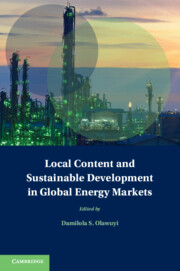Book contents
- Local Content and Sustainable Development in Global Energy Markets
- Reviews
- Treaty Implementation for Sustainable Development
- Local Content and Sustainable Development in Global Energy Markets
- Copyright page
- Contents
- Preface and Acknowledgements
- Abbreviations
- Editor
- Contributors
- Part I Introductory Context and Principles
- Part II Case Studies
- 6 Expressing Local Content through Black Economic Empowerment in the South African Petroleum Industry
- 7 Local Content Frameworks for Petroleum Industry Operations in the CEMAC Region: An Evaluation of Their Functionality, Sustainability and Normative Underpinnings
- 8 Local Content, Angolanização, and Sustainable Development in Angola
- 9 Local Content and the Sustainable Development of Oil and Gas Resources in Nigeria
- 10 Local Content Requirements and Treaty Implementation in Kenya’s Petroleum Sector
- 11 Sustainability and Local Content Requirements in Australian Oil and Gas Development: Has the Ship of Opportunity Sailed?
- 12 Local Content for Sustainable Development in Middle East and North Africa: Current Legal Approaches and Future Directions
- 13 Local Content and Sustainable Development in Norway
- 14 Local Content and Sustainable Development in Argentina
- 15 The Latin American Experience in Designing Local Content Policies in the Oil and Gas Sectors: Strengths, Limitations, and Future Perspectives
- 16 Local Content and Sustainable Development in Brazil
- 17 Industrial Policy and Local Content Rules in US Energy Policy
- 18 Oil and Gas Sector Local Content Decision Processes: Canadian Indigenous Participation
- Part III Lessons Learned and Future Directions
- Index
10 - Local Content Requirements and Treaty Implementation in Kenya’s Petroleum Sector
from Part II - Case Studies
Published online by Cambridge University Press: 05 March 2021
- Local Content and Sustainable Development in Global Energy Markets
- Reviews
- Treaty Implementation for Sustainable Development
- Local Content and Sustainable Development in Global Energy Markets
- Copyright page
- Contents
- Preface and Acknowledgements
- Abbreviations
- Editor
- Contributors
- Part I Introductory Context and Principles
- Part II Case Studies
- 6 Expressing Local Content through Black Economic Empowerment in the South African Petroleum Industry
- 7 Local Content Frameworks for Petroleum Industry Operations in the CEMAC Region: An Evaluation of Their Functionality, Sustainability and Normative Underpinnings
- 8 Local Content, Angolanização, and Sustainable Development in Angola
- 9 Local Content and the Sustainable Development of Oil and Gas Resources in Nigeria
- 10 Local Content Requirements and Treaty Implementation in Kenya’s Petroleum Sector
- 11 Sustainability and Local Content Requirements in Australian Oil and Gas Development: Has the Ship of Opportunity Sailed?
- 12 Local Content for Sustainable Development in Middle East and North Africa: Current Legal Approaches and Future Directions
- 13 Local Content and Sustainable Development in Norway
- 14 Local Content and Sustainable Development in Argentina
- 15 The Latin American Experience in Designing Local Content Policies in the Oil and Gas Sectors: Strengths, Limitations, and Future Perspectives
- 16 Local Content and Sustainable Development in Brazil
- 17 Industrial Policy and Local Content Rules in US Energy Policy
- 18 Oil and Gas Sector Local Content Decision Processes: Canadian Indigenous Participation
- Part III Lessons Learned and Future Directions
- Index
Summary
Kenya, having recently discovered roughly 560 recoverable million barrels of oil in its Northern region, is now preparing to move into the development phase of the reserves. These discoveries have created significant expectations among the local populace of the sector’s potential to generate wealth, significantly reduce poverty, and spur much-needed economic development, especially in the marginalised areas where the resources have been found. With this comes the urgent need to design robust laws and policies to maximize the potential sustainable development gains and avoid the oft’ touted resource-curse trajectory that other mature oil-rich countries in Africa have unsuccessfully grappled with. The discourse on how to facilitate national ownership and control of petroleum resources has already began stimulating a myriad of legislative efforts towards embedding local content. However, this has resulted in conflicting local content legislation, regulatory and policy proposals, such as the Local Content Bill and the Petroleum (Local Content) Regulations, among others. Intense debate has been sparked regarding the potential incompatibility of the proposed legislations with international trade measures applicable to members of the World Trade Organisation (WTO), including Kenya. This chapter examines concerns of social exclusion, environmental tradeoffs, misalignment with WTO rules, and incoherent application of LCRs that have been raised in the design and implementation of LCRs in Kenya. It discusses economic, environmental, and social considerations that current and proposed local content laws and policies ought to mainstream so as to deliver a robust and effective local content legislative framework.
- Type
- Chapter
- Information
- Publisher: Cambridge University PressPrint publication year: 2021

